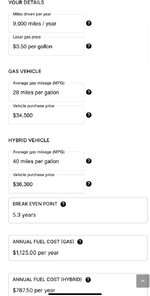I’m in the market for a brand new 2023 RAV4 LE AWD (all of them are AWDs in a 200 miles radius), and I have gotten quotes at MSRP for both. Considering that I work from home (remote) and drive around 7-9k miles a year, with a break even point at around 5 years (attached), which would you pick?
Hybrid: $36,364.00 (out of the door price) reserved for early November arrival.
Brake pads last longer
No starter
10 year warranty on battery
Gas: $34,500.00 (OTD price) in stock.
I like to hold vehicles for at least 10 years.
Suburban driving outside of DC, so will see some I-495 and I-66 traffic.
I don’t commute during the week and primarily drive on the weekends.
Since I drive so little, I feel like I’m not the best candidate for a hybrid, but the minimal $ increase makes it tempting. A lesser priced FWD would make the decision easier, but it wouldn’t be as safe as an AWD. Thank you.
Hybrid: $36,364.00 (out of the door price) reserved for early November arrival.
Brake pads last longer
No starter
10 year warranty on battery
Gas: $34,500.00 (OTD price) in stock.
I like to hold vehicles for at least 10 years.
Suburban driving outside of DC, so will see some I-495 and I-66 traffic.
I don’t commute during the week and primarily drive on the weekends.
Since I drive so little, I feel like I’m not the best candidate for a hybrid, but the minimal $ increase makes it tempting. A lesser priced FWD would make the decision easier, but it wouldn’t be as safe as an AWD. Thank you.

